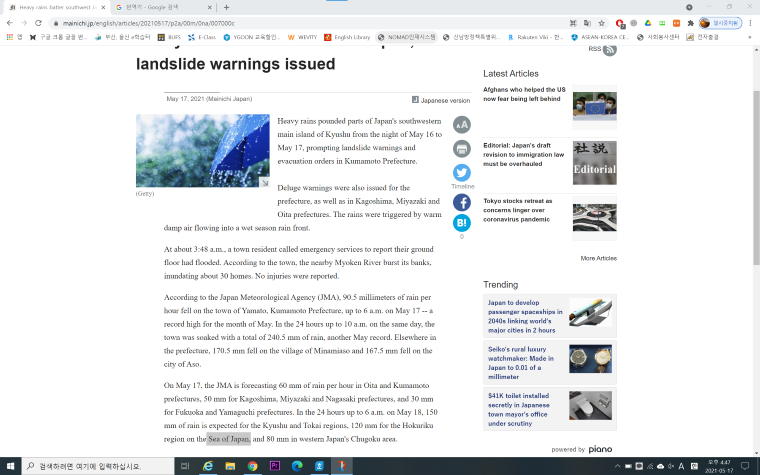|
| 서한 |
시정서한 |
|
| 매체 |
웹사이트
|
|
| 이슈 |
동해
|
|
| 언어 |
영어
|
|
| 서한보내는곳 |
https://mainichi.jp/english/articles/20210517/p2a/00m/0na/007000c |
|
| 오류내용 |
동해를 sea of japan으로 오표기 |
|
| E-mail / Contact |
https://mainichi.jp/english/contact/ |
|
서론 |

Dear MAINICHI. I am Seowon Noh, a high school student in Korea. In the content of your website, "East Sea" was found to be incorrectly marked with only "Sea of Japan", and we hope that the historical background will be explained, and articles after this time will be correctly marked [East Sea or Sea of Japan (Sea of Japan)]. Send correction mail
|
|
| 본론 |
‘East Sea’ is a name that has been used by Koreans for over 2,000 years, and this can be confirmed in various historical sources and old maps. On the other hand, the name 'Sea of Japan' is claimed to be the first name used in Matteo Ricci's "Gonyeo Mangukjeon" in 1602. It is proven through various feeds. In particular, Japan presented the results of an ancient Western map survey indicating that the use of the'Sea of Japan' increased in the 19th century, and claimed that the name'Sea of Japan' was established in the 19th century. The fact that a number of maps made in Japan at the time marked the East Sea waters as “Sea of Joseon” shows that the name “Sea of Japan” was not established even in Japan.
|
|
| 결론 |
'East Sea' has been used for more than 2,000 years, and is still used by 75 million Korean people, and has an important meaning to us as it appears in the first verse of the national anthem. Nevertheless, unlike Japan, we do not insist on the use of ‘East Sea’ alone instead of ‘Sea of Japan’, and we are presenting a rational way to write the names used by both sides together. Therefore, ‘Japan Sea’ in your news article should be written as ‘East Sea’ or ‘East Sea (Japan Sea)’. Please correct the incorrect notation in this article and make an effort so that it will be correctly indicated in future articles. |

